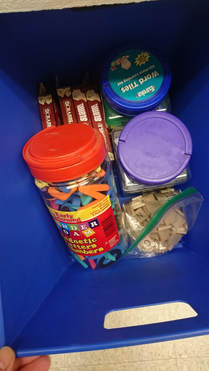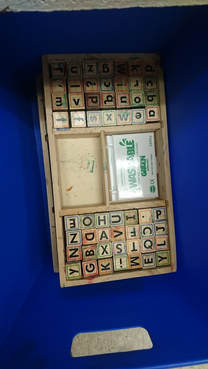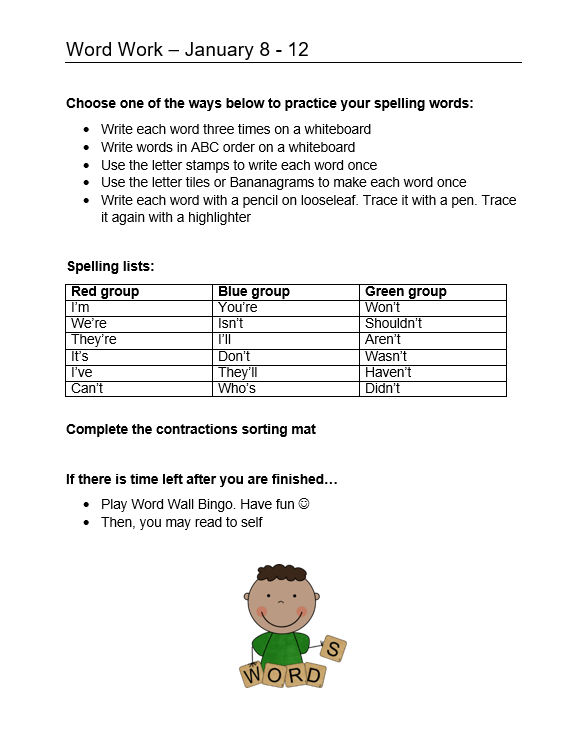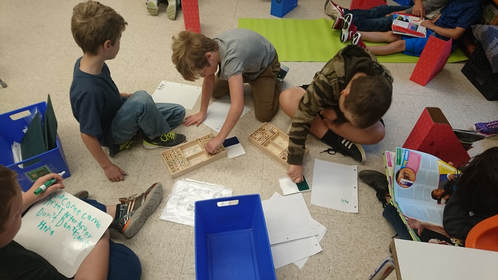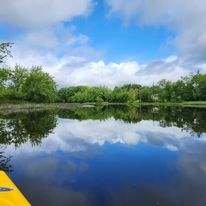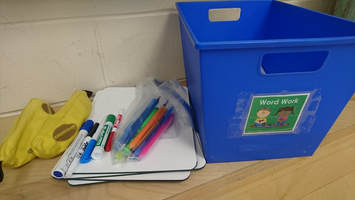
Word work is an excellent opportunity to create an engaging learning experience for elementary school students. My students complete a word work activity in small groups once a week in my grade three classroom, and it is arguably their favourite component of Daily 5 (which includes read to self, read to someone, read with the teacher, word work, and work on grammar). It's also accessible to a diverse range of abilities.
How I set it up:
I keep a basket in my classroom with a "Word Work" label that features text and a graphic, so it is easy for all students to locate. The basket contains all of the materials that students need to complete their work. This makes it easier for students to complete their work, and it also enables them to maximize their time spent on task because they do not need to spend time locating materials.
Students can choose which day they complete word work, and must complete it once each week. They may choose where they sit, and they work in a small group of 4-6 students. The word work basket includes a list of instructions for students to follow, and they complete the assigned work during that time. It usually consists of practicing weekly spelling words, and a word game. Sometimes I also have students complete sorting mats to reinforce a given concept.
Every Friday, after all the groups have had a chance to complete word work, I take out the materials and instructions and replace them with new ones so it's ready for the following week.
Materials I keep in the basket at all times include:
- White boards
- Dry erase markers and erasers
- Pencils
- Pens
- Highlighters
- Paper
- Bananagrams and letter tiles
- Wikki Stix
- Set of instructions for the week
- Game of the week and instructions
Activities:
Students begin by practicing for a weekly spelling quiz. I give a few different options for students to complete this task:
- Copy spelling words three times on a white board
- Record spelling words on a sheet of paper with a pencil, trace over them with a pen, then trace over them again with a highlighter.
- Use letter tiles or Bananagrams to make each spelling word
- Use stamps, ink pad, and paper to stamp each spelling word
- Build spelling words with Wikki Stix
Another note about spelling lists: I offer three different choices of list each week that students can choose from. Each list has a different level of difficulty, but share a given focus (e.g. all of the spelling words use the long e sound). Students can choose any list they like each week.
- Scattegories*
- Boggle*
- Word for Word
- Word wall bingo* - give students a blank grid and they fill each space of the grid with a different word wall word as the caller selects words from the word wall
- Hangman
- Bananagrams
- Scrabble
- Classwords
I also make my own simplified instruction cards for each game, so that students can review the instructions before playing.
*Download these games below
|
|
| ||||||
How does word work fit into the UDL framework?
Students are given a lot of choices:
- They choose which day they complete the activity
- They choose where to sit
- They choose which spelling list to work on each week
- They choose how they will practice their spelling words each week
Activities are accessible to a diverse range of learners:
- Students can select the spelling list that best meets their needs, as each list varies in levels of difficulty. This way some students are working on simpler lists, and others who need a challenge can work on the more challenging lists
- When practicing spelling words, students can select a method that works best for them. They can write on paper with a pencil, pen, and highlighter. Students who prefer/need less sensory feedback when writing can write their words on a whiteboard. Students who struggle with printing/writing can opt to build the letters out of wikisticks, or form the words with letter tiles or stamps.
It fosters collaboration and community:
- Students sit in a small group, and play a word game together.
- I also allow students to choose when they do the activity each week, so the groups tend to be of mixed ability, and students are trained to help each other as needed.
It's fun!
- Students are always engaged in word work because they can practice their spelling words in a variety of ways, and the games are rotated on a weekly basis so they do not tire of the word games provided.
